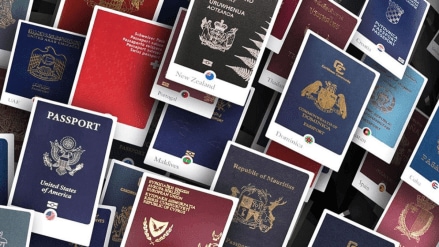Singapore and Japan break away from the group of six countries that shared top spot last year to secure gold and silver, respectively, on the 2025 Henley Passport Index, which ranks all the world’s 199 passports according to the number of destinations they can access visa-free, and is based on exclusive Timatic data from the International Air Transport Association (IATA). Timatic is a leading provider of real-time information on travel document requirements for international air travel.
Singapore reclaims its crown as the most powerful passport in the world with visa-free access to 195 out of 227 destinations worldwide, leaving Japan in the runner-up spot with a score of 193 but still ahead of the rest after it regained visa-free access to neighboring China for the first time since the Covid lockdowns.
Several EU member states — France, Germany, Italy, and Spain — drop two places in the ranking to 3rd position, and are joined by Finland and South Korea, which each lost a place over the past 12 months and now have access to 192 destinations with no prior visa required.
A seven-nation EU cohort, all with visa-free access to 191 destinations — Austria, Denmark, Ireland, Luxembourg, Netherlands, Norway, and Sweden — share 4th place, while five countries — Belgium, New Zealand, Portugal, Switzerland, and the UK — come in 5th with 190 visa-free destinations.
On the other end of the mobility spectrum, Afghanistan, unsurprisingly, remains firmly entrenched at the bottom of the Henley Passport Index, having lost visa-free access to a further two destinations over the past year, creating the largest mobility gap in the index’s 19-year history, with Singaporeans able to travel to 169 more destinations visa-free than Afghan passport holders.
The rest of the index’s Top 10 is largely dominated by European countries, except for Australia (6th place with 189 destinations), Canada (7th place with 188 destinations), the US (9th place with 186 destinations), and the UAE, the first and only Arab state to ever make it into the upper echelons of the rankings.
The UAE is one of the biggest climbers on the index over the past decade, having secured access to an additional 72 destinations since 2015, enabling it to climb 32 places to 10th spot with visa-free access to 185 destinations worldwide.
Only 22 of the world’s 199 passports have fallen down the Henley Passport Index ranking over the past decade. Surprisingly, the US is the second-biggest faller between 2015 and 2025 after Venezuela, plummeting seven places from 2nd to its current 9th position.
Vanuatu is the third-biggest faller, losing six places from 48th to 54th position, followed by the British passport, which was top of the index in 2015 but now sits in 5th place. Completing the Top 5 losers list is Canada, which dropped three ranks over the past decade from 4th to its current 7th place.
In contrast, China is among the biggest climbers over the past decade, ascending from 94th place in 2015 to 60th in 2025, with its visa-free score increasing by 40 destinations in that time. And in terms of its openness to other nations, China has also risen on the Henley Openness Index, which ranks all 199 countries and territories worldwide according to the number of nationalities they permit entry to without a prior visa.
China granted visa-free access to a further 29 countries over the past year alone, and now sits in 80th position, granting visa-free entry to a total of 58 nations as the new year commences, compared to its rival America, which ranks 84th and allows just 46 other countries access without a prior visa.
US nationals currently constitute the single largest cohort of applicants for alternative residence and citizenship, accounting for a staggering 21% of all investment migration program applications received by Henley & Partners in 2024. CEO Dr. Juerg Steffen says the firm has more American clients than the next four biggest nationalities — Turkish, Filipino, Indian, and Brits — combined.
“Faced with unprecedented volatility, investors and wealthy families are adopting a strategy of geopolitical arbitrage to acquire additional residence and/or citizenship options to hedge against jurisdictional risk and leverage the differences in legal, economic, political, and social conditions across countries to optimize their personal, financial, and lifestyle outcomes.”
Looking ahead to 2025, projections by Henley & Partners and New World Wealth indicate an even greater surge in millionaire migration worldwide, with 142,000 high-net-worth individuals with liquid investable wealth of USD 1 million or more expected to relocate and seek new horizons.
